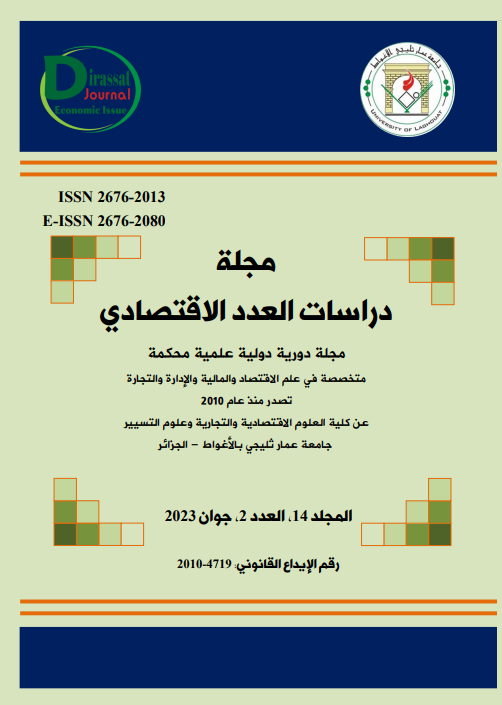تأثير القيادة التحويلية على الإبداع: دراسة حالة مؤسسة سونلغاز -الأغواط -
الملخص
هدفت هذه الدارسة إلى قياس أثر القيادة التحويلية في الإبداع لدى عاملي شركة توزيع الكهرباء والغاز بالأغواط، وذلك انطلاقا من اعتبار القيادة التحويلية بأبعادها (التأثير المثالي، التحفيز المثالي، الاستثارة الفكرية والاعتبارية الفردية) متغيرا مستقلا، والإبداع باعتباره متغيرا تابعا. ولأجل تحقيق هدف الدراسة، تم اعتماد استبيانا وزع على عينة ميسرة حجمها 32 فردا، وأيضا اعتماد تقنية الانحدار الخطي باستخدام برنامج spss لأجل التحليل وقياس الأثر واختبار الفرضيات المنطلق منها. وقد توصلت الدراسة إلى وجود أثر دال احصائيا للقيادة التحويلية في الابداع عند 5%. كما يوصي الباحثين الشركة محل الدراسة بأن تأخذ بجدية أهمية القيادة التحويلية عبر تشجيع وتدريب العاملين بهدف تقديم أفكار، تحسين أدائهم وتحفيزيهم ليكونوا أكثر إبداعا.
التنزيلات
المراجع
Sorensen، A. and Epps, R. “Community Leadership and Local Development,” Journal of Rural Studies, 1996.p86.
David Meier, Situational Leadership Theory as a Foundation for a Blended Learning Framework, Journal of Education and Practice, Vol.7 No.10, 2016 .
Allan Nawaz and others, Leadership Theories and Styles: A Literature Review, Journal of Resources Development and Management, Vol.16, 2016,p57.
Cho, J.W., & Dansereau, F. (2010). Are transformational leaders fair? A multi-level study of transformational leadership, justice perceptions, and organizational citizenship behaviors. Leadership Quarterly, p21.
Bennis, W. and Thomas, R. (2004). Crucibles of Leadership. Harvard Business Review. January issue,p 81.
. Drucker, P, What makes an effective executive? Harvard Business Review. January issue, 2004.
p26.
Books :
David R. Kolzow, PhD, Leading From Within: Building Organizational Leadership Capacity, ohio, 2014,p65.
E.P. Hollander & J.W. Julian, Contemporary trends in the analysis of leadership process, Psychological Bulletin,USA,p83.
Robbins, S. P, Judge, T. A., & Sanghi, S. Organizational Behavior, New Delhi: Pearson Education, vol.13, 2007, P114.
Robert Blake and Jane Mouton, The Managerial Grid: The Key to Leadership Excellence, 1964,p84.
Stephen J. Zaccaro and Richard J. Klimoski, Editors, The Nature of Organizational Leadership: Understanding the Performance Imperatives Confronting Today’s Leaders. San Francisco, CA: Jossey-Bass, (2001).
Paul Hersey and Ken Blanchard, Management of Organizational Behavior: Utilizing Human Resources, 1982
Bass, B. M. Two Decades of Research and Development in Transformational Leadership. European Journal of Work and Organizational Psychology, 1999.
Bernard M. Bass & Ronald E. Riggio, transformational leadership, Lawrence Erlbaum Associates-Inc, New Jersey, 2006
Savita Yadav, Challenges Face by Transformational leader and suggestions to solve the challenges, IJRIM, Vol.7, Issue 5, May 2017.
Amabile, T. M. (1996). Creativity in context: Update to" the social psychology of creativity.". Westview press.
JM, Burnes, leadership, Harper Perennial Political Classics, USA, 1978.
David Meier, Situational Leadership Theory as a Foundation for a Blended Learning Framework, Journal of Education and Practice, Vol.7 No.10, 2016 , Research Scholar, National School of Leadership, Pune India.
الحقوق الفكرية (c) 2023 Ahmida Ferhat

هذا العمل مرخص حسب الرخصة Creative Commons Attribution-NonCommercial 4.0 International License.









